As a restaurant owner, you're likely familiar with the challenge of expecting a lot of diners on a Saturday evening, only to find that many of them ignored their reservations and failed to show up.
Situations like this, especially if repeated, can affect your restaurant's income and long-term stability.
Luckily, there's a solution that can help lessen this risk a little bit—introducing cancellation fees.
In this guide, we'll explain what cancellation fees are, the reasons for charging them, situations where they might be applied, methods for effectively putting them into use, and more.
Our goal is to provide you with insights that can help avoid the undesirable situation described earlier and protect the well-being of your business.
Let's begin with a clear explanation of cancellation fees.
What Is a Restaurant Cancellation Fee
A restaurant cancellation fee is charged when patrons with reservations fail to show up or cancel within a specified time frame.
The existence of the fee nudges patrons to honor their booking or give advance notice if their plans change.
The latter allows you to fill the tables with new guests without missing any revenue.
Cancellation fees aren't meant to punish customers or merely collect funds. Rather, they serve to safeguard your business.
And unfortunately, recent statistics confirm a pressing need for such measures.
In May 2023, Barclaycard Payments, a well-known global payment business, surveyed 200 UK restaurant owners and 2000 UK diners.
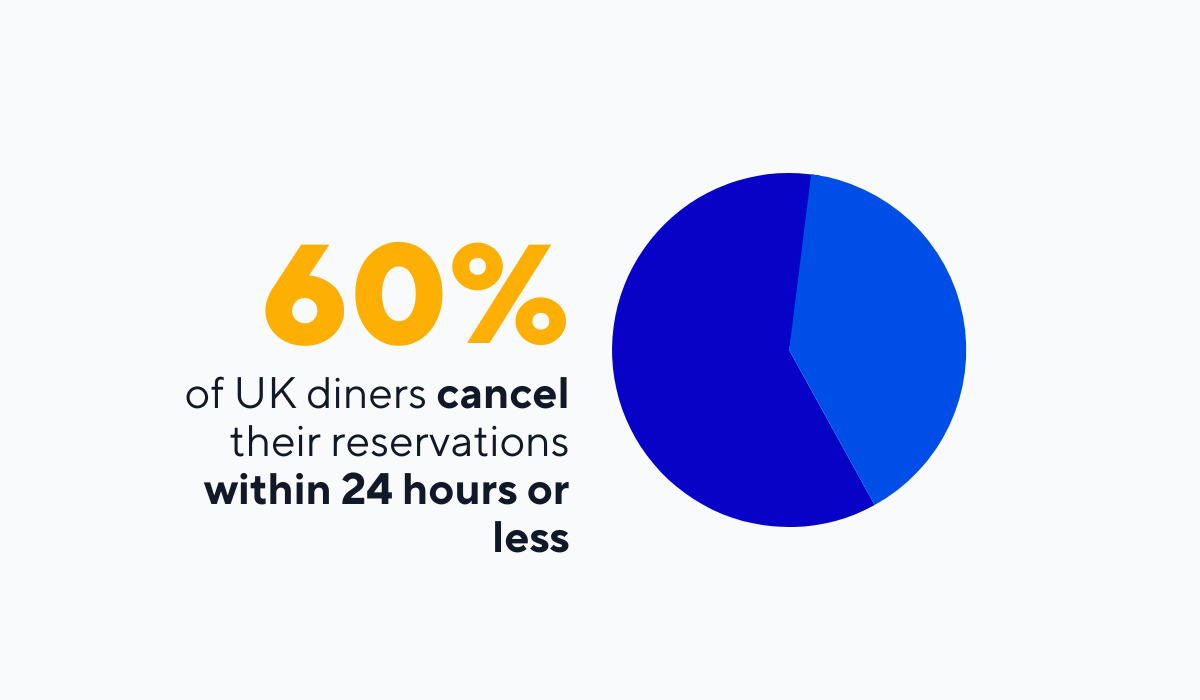
Illustration: Tablein / Data: Barclays
The study found that 60% of diners cancel their reservations within 24 hours or less, with no-shows being the most frequent form of cancellation at 19%.
So, even if customers do cancel, this often happens too close to the reservation time, and restaurants cannot fill the empty tables. As a result, they lose their revenue for that table.
When this becomes a recurring issue, it undermines the financial stability of restaurants.
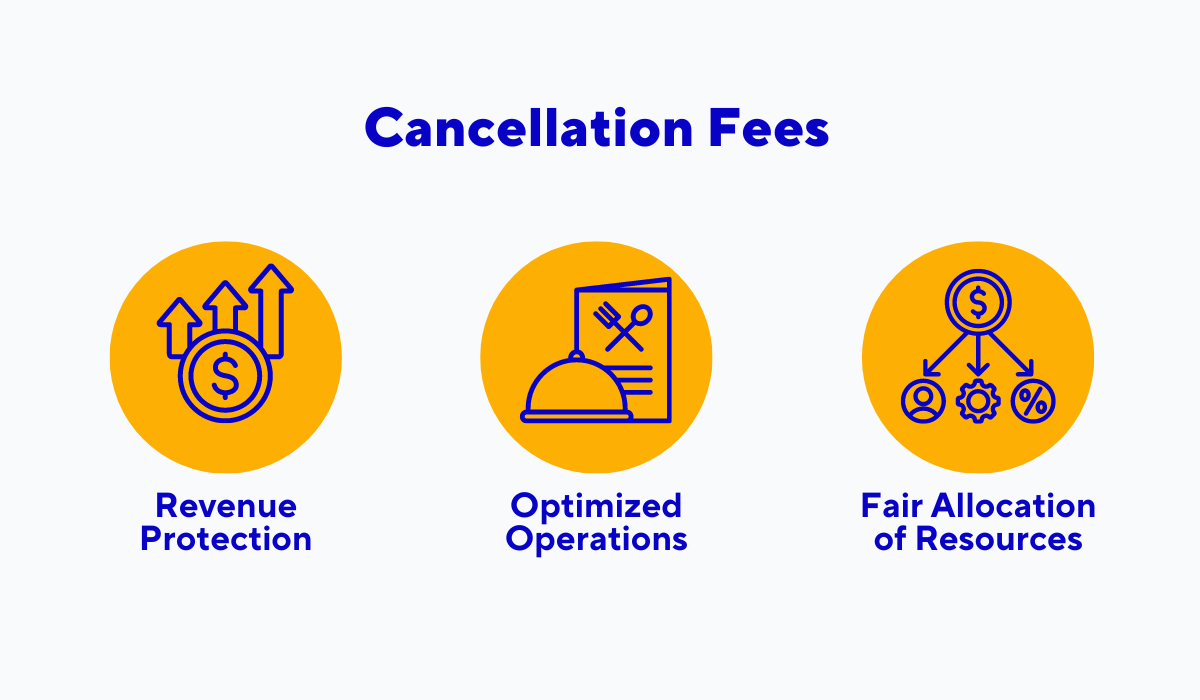
Source: Tablein
Let's now examine the three reasons behind implementing cancellation fees more closely.
Revenue Protection
The first reason for using cancellation fees, not just in restaurants but in any business, is to guard against a possible loss of earnings due to sudden reservation changes.
These changes might involve changing guest numbers or even canceling reservations altogether.
However, the idea of facing cancellation fees encourages customers to think twice before canceling at the last minute or not showing up.
The survey we mentioned above also showed that half (50%) of respondents recognize the restaurants' financial challenges in the current economic climate.
More than a quarter (27%) admit they would cancel bookings earlier if they knew it directly impacted the restaurant and its staff.
Ideally, restaurants hope this to be the result of cancellation fees rather than collecting the payments.
So, by discouraging no-shows and late cancellations, restaurants can better maintain a consistent flow of customers and revenue, especially during busy times.
Optimized Operations
When people cancel unexpectedly, it can mess up a restaurant’s entire operation.
To prevent this, cancellation fees motivate customers to stick to their plans or give early notice, allowing the restaurant to organize tables better and offer smoother service.
The entire restaurant benefits from this improvement.
Fair Allocation of Resources
Restaurants invest time, effort, and resources to prepare for reservations. But when guests cancel at the eleventh hour, these resources often go to waste.
For instance, consider Kaiseki Yu-zen Hashimoto Restaurant in Toronto, which enforces a 100% charge for day-of cancellations, amounting to $300 per person.
The steepness of the fee reflects the restaurant's practice of ordering fresh ingredients based on reservations and starting food preparation a day in advance.
Without charging cancellation fees, they would suffer significant losses regarding ingredients and prep efforts.
In a nutshell, cancellation fees encourage responsible booking behavior, making sure customers' commitment matches the restaurant's efforts.
All this leads to a balanced allocation of resources.
Hopefully, we’ve given you a clear understanding of what cancellation fees are. Let's now move on to explore the legal side of using these fees in your restaurant.
Is It Legal to Implement a Cancellation Fee
As we have just seen, no-shows and last-minute cancellations, unfortunately, harm the restaurant industry.
As a result, it's not surprising that restaurant owners have searched for ways to mitigate the revenue loss caused by these events.
However, when this practice affects customers financially, questions naturally arise regarding its legality.
To address this question accurately, it's extremely important to familiarize yourself with the specific regulations and laws governing restaurant policies in your area, as they can vary significantly.
Nonetheless, there are fundamental guidelines that can help ensure the lawful implementation of cancellation fees:
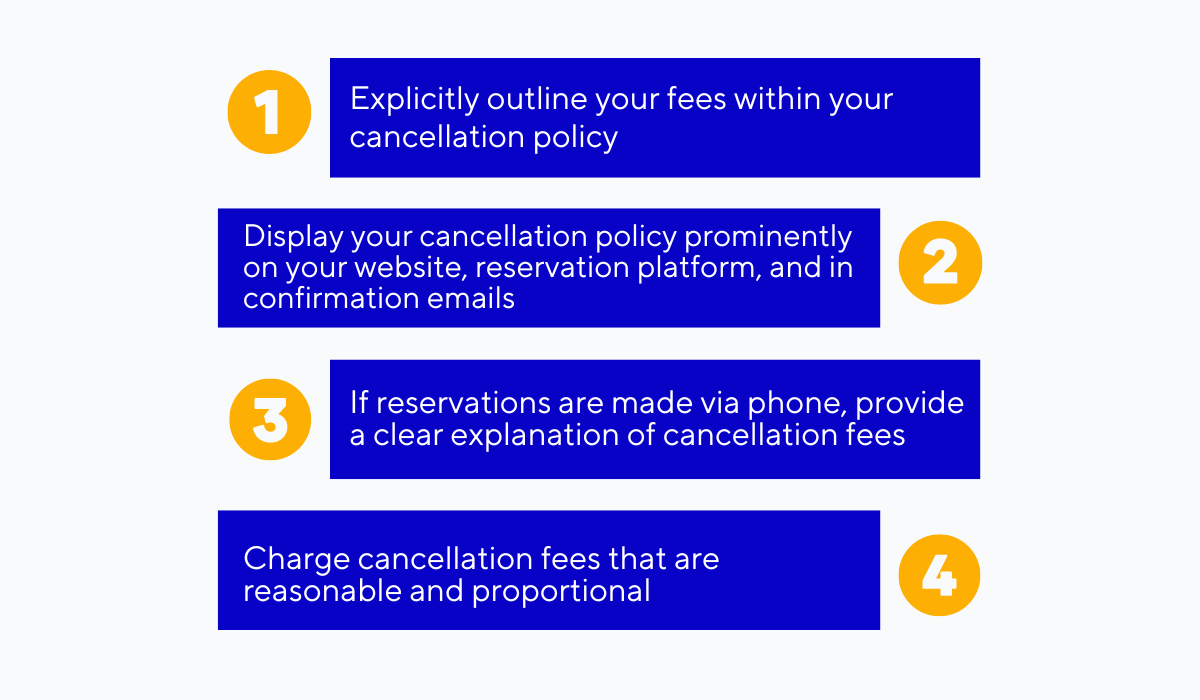
Source: Tablein
When customers make a reservation, they are essentially entering into an implicit agreement.
Clearly communicating the existence of cancellation fees, the amount, and the reasonable time frame for canceling as part of this agreement provides a legal foundation for implementing such fees.
However, it goes without saying you should make sure to get familiar with the regulations in your legal area before charging cancellation fees in your restaurant.
Can Customers Dispute a Cancellation Fee
Customers can potentially dispute cancellation fees if the essential conditions are not met.
To be legally valid, these fees must be clearly communicated to customers, and they have to be given the exact amount and a reasonable cancellation window, as we explained in the previous chapter.
For example, Kaiseki Yu-zen Hashimoto, the Japanese restaurant we mentioned earlier, sticks to this by presenting their cancellation policy on their website and outlining fees for day-of cancellations and guest number reductions.
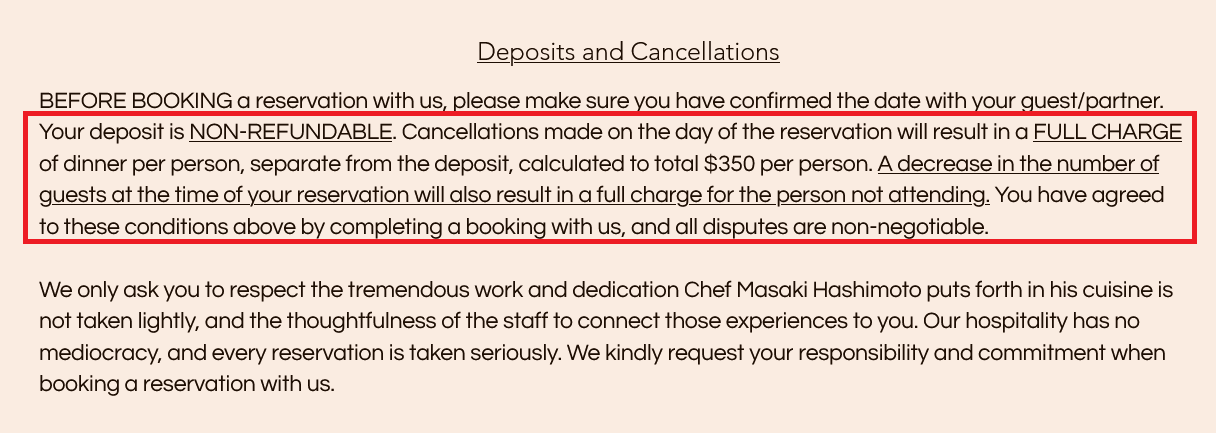
Source: Kaiseki Yu-zen Hashimoto
Though a robust policy usually prevents disputes, situations like the one this Reddit user faced can arise.

Source: Reddit
In their case, despite following the restaurant’s advice to make a reservation when emailing ahead about a nut allergy, they faced a fee when canceling within 48 hours because the restaurant didn’t contact them to confirm whether they could accommodate the allergy as their staff said they would.
Such cases underscore the customer’s right to dispute fees when communication is inadequate.
So, keep in mind that proper communication mitigates disputes and ensures a fair understanding between customers and restaurants when it comes to fees.
When Should You Charge a Cancellation Fee
Determining when to apply a cancellation fee in restaurants revolves around three scenarios:
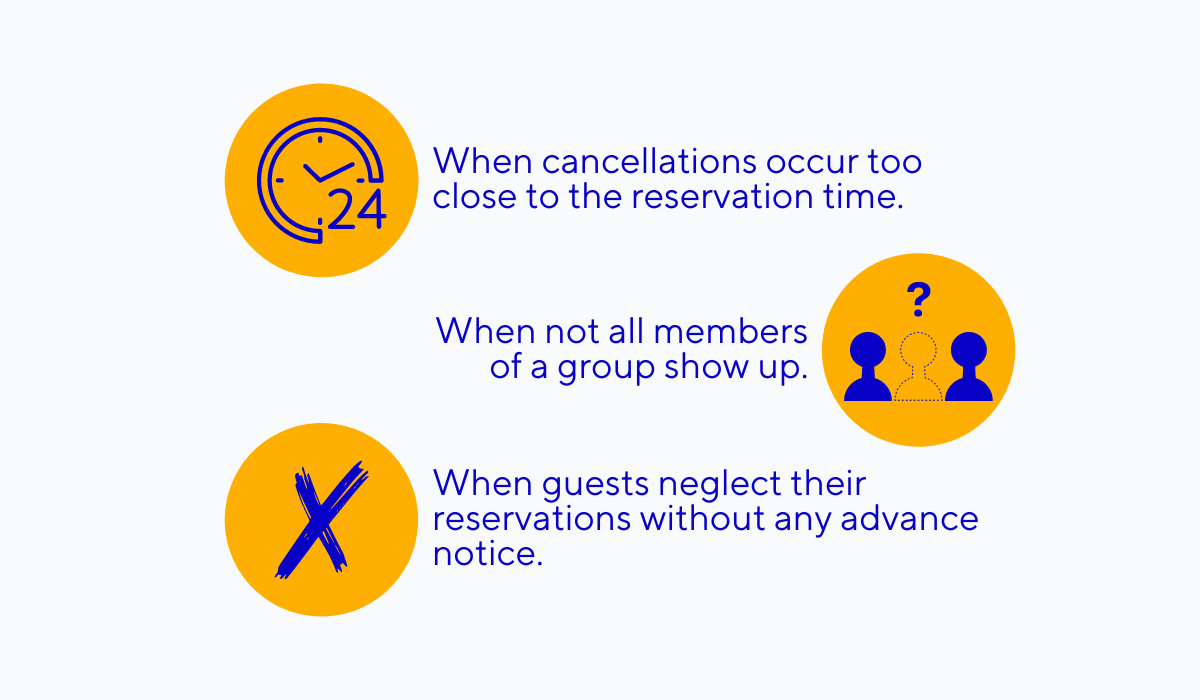
Source: Tablein
In these situations, the chances of finding replacement guests are often slim, which is a good enough reason to charge cancellation fees.
However, the crucial decision lies in setting the time frame for diners to cancel without penalties.
After all, plans change, and unexpected situations happen, so you should allow some flexibility in canceling reservations.
The time frame for canceling reservations varies among restaurants.
Some refrain from charging fees for cancellations made 24 hours or more before the reservation, while others extend this window to 48 hours or even charge fees for cancellations within 5 days of the reservation.
In the end, the choice of time frame will depend on your restaurant's specific conditions, such as meal preparation schedules, ingredient purchasing practices, and more, as well as the flexibility you are willing to offer your patrons.
How Much Should You Charge for Cancellations
The amount to charge for cancellation fees can vary significantly based on factors unique to your restaurant.
It’s essential to strike a balance between reflecting the inconvenience caused by cancellations and not discouraging potential customers from making a reservation in the first place.
In a casual dining establishment, a reasonable approach might involve a small cancellation fee, such as £10 per person, for cancellations made within 24 hours of the reservation.
This fee responds to the restaurant’s preparation efforts without being overly burdensome for customers.
However, lower fees may not always yield the desired results, as illustrated by the Palmerston restaurant in Edinburgh.
The co-founder James Snowdon explains that they had to increase the cancellation fee from £10 to £20 because many “people don’t bat an eyelid at that [£10],” and charging a bigger fee made people more aware of the financial consequences of not showing up or canceling too late.
On the other hand, in an exclusive fine-dining venue that relies heavily on reservations for revenue and offers carefully crafted menus, higher fees could be justified.
For instance, a cancellation fee of 50% of the expected meal cost for cancellations made within 48 hours might be appropriate.
For example, Salt from Stratford-upon-Avon charges such cancellation fees for lunch and dinner reservations, while for special events or pre-reserved menus, the fee is the total cost of the agreed menu.

Source: Salt
This fee accounts for the complex preparation involved, but it also makes sure that guests are more committed to securing and honoring a reservation in such a sought-after establishment.
In summary, the fee amount should match your restaurant’s operational expenses, the level of service provided, and the potential impact of cancellations on your bottom line.
How to Implement a Restaurant Cancellation Fee
Now that you have a thorough understanding of cancellation fees, let’s see how you can start charging them in your restaurant.
To begin with, you will need to collect customer credit card details. However, managing such information over the phone is not really appropriate or secure.
Instead, you need a tool that will securely collect this data and take payments on your behalf—restaurant reservation software.
Our software Tablein, for example, offers a comprehensive solution that can do both of these things and more.
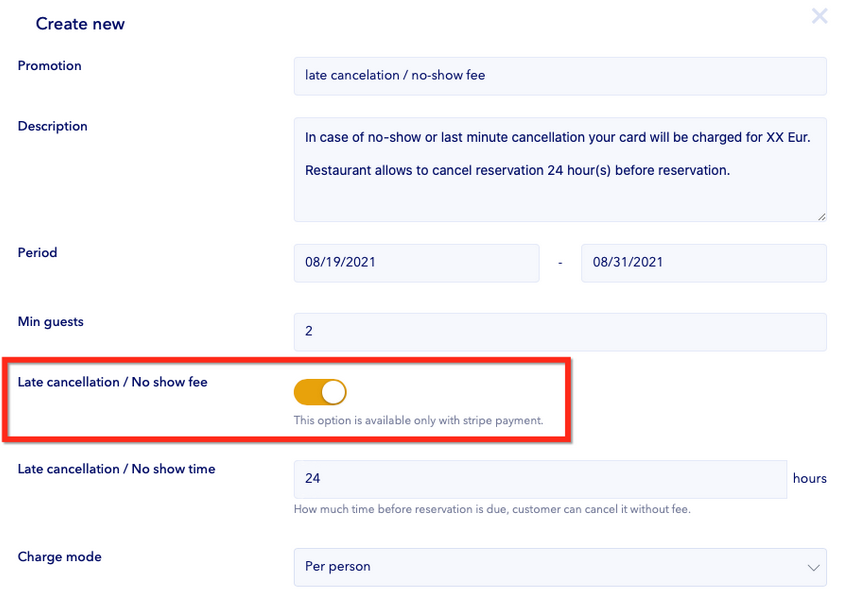
Source: Tablein
Because of Tablein’s integration with Stripe, a trusted payment gateway, Tablein, first and foremost, facilitates secure and efficient payment handling.
Moreover, in the settings, restaurant managers can set up cancellation fee parameters like the amount to charge for no-shows and late cancellations, and add a specific time frame for canceling without penalties.
When patrons make reservations through Tablein, the system prompts them to provide their credit card details. To ensure data security, an initial verification of a zero amount is processed.
Then, once card details are securely added, guests can finalize their reservation through Tablein’s user-friendly interface, which also shows the restaurant’s reservation booking policy, as you can see in the Dark Horse Mumbles restaurant example below.
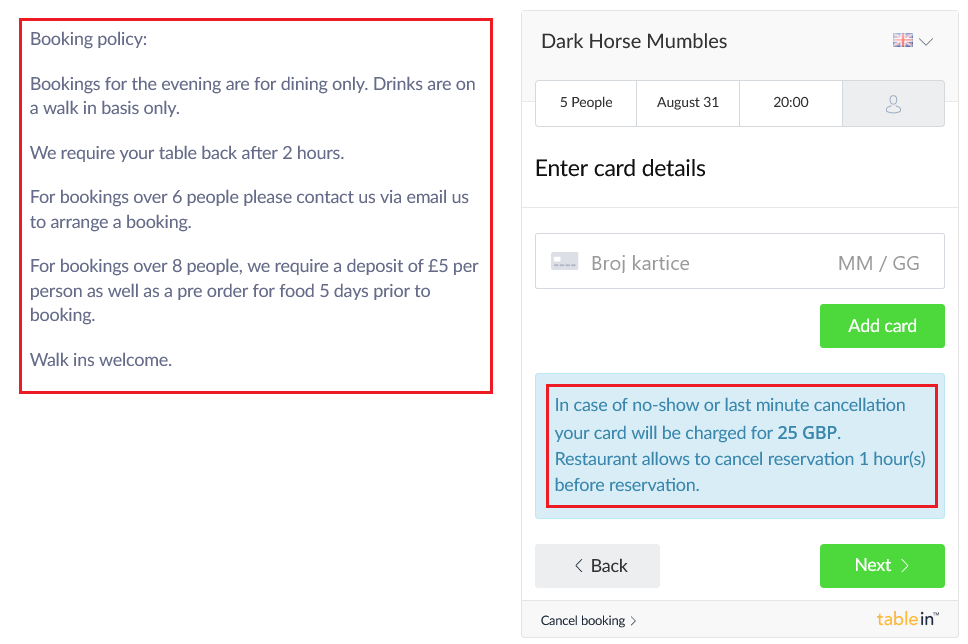
Source: Dark Horse Mumbles
And now to the best part.
In cases where guests fail to show up or cancel within the specified time frame, the software kicks into action.
Your task is only to adjust the reservation status, and Tablein does the rest.
The system automatically triggers the payment process, applying the relevant no-show or cancellation fee and making sure you get your portion of revenue after all.
Now that you know how to implement cancellation fees in your restaurant, let’s address the last thing today—creating a robust cancellation policy.
What Should You Include in Your Cancellation Policy
A comprehensive cancellation policy is crucial for implementing cancellation fees smoothly.
This policy serves as a legal framework that outlines the rules and procedures for cancellations, ensuring fairness and transparency for both customers and the restaurant.
It’s important to cover three main elements in your cancellation policy—the time frame, the ways to cancel, and the financial consequences for customers.
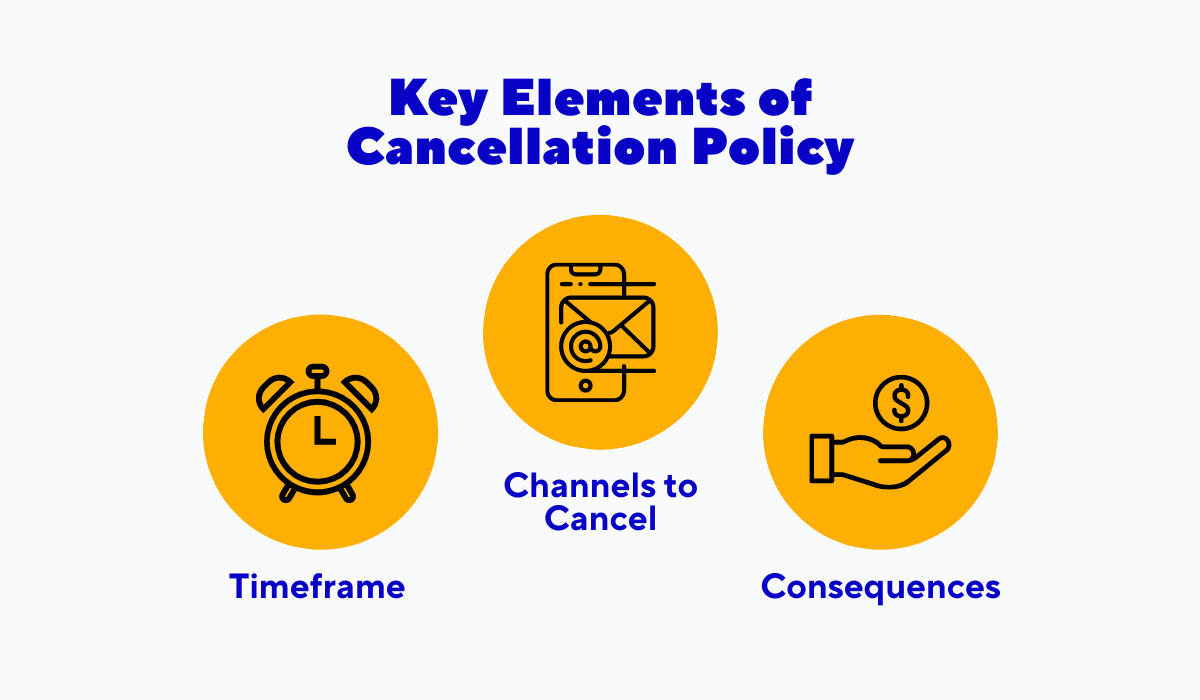
Source: Tablein
As we’ve already discussed these elements throughout this guide, let’s briefly recap using a notable example of a cancellation policy from Lovage by Lee Smith, a London-based restaurant.
Lovage starts its well-crafted policy by notifying customers that card details will be gathered to confirm reservations without immediate charges.
They then outline that charges, £20 per person, will be applied to a credit card for no-shows or cancellations within 24 hours of the reservation.
This provides clear information about the fee amount and the applicable time frame.

Source: Lovage
Additionally, Lovage clarifies that patrons have the flexibility to modify reservations before the 24-hour mark without incurring charges.
The policy also offers a convenient way for customers to reach out by sharing the restaurant’s phone number and email address for reservation changes or cancellations.
Lovage’s cancellation policy is an excellent example of what to include in your policy to keep customers well-informed and set expectations for both parties from the start.
How to Notify Customers About Your Cancellation Policy
Once you've carefully developed a cancellation policy that includes the three key elements discussed earlier, the next step is to effectively inform your customers about this policy and the cancellation fees that come with it.
We recommend making your cancellation policy highly visible across various channels you use.
This will ensure that your customers not only come across the policy but also take the time to read and understand it.
Begin with placing the cancellation policy prominently on your official website.
However, remember to ensure it's easy to find and prominently displayed rather than hidden away on a less-visited page.
Furthermore, it would be wise to integrate the cancellation policy into your online reservation widget.
This way, guests will be immediately informed about the policy and fees before making a reservation.
In practice, the reservation widget looks something like this:
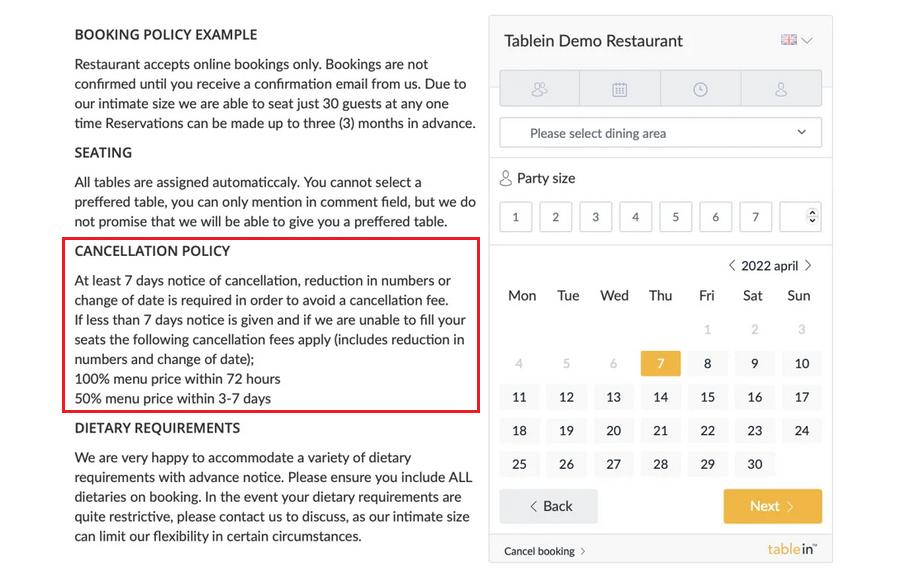
Source: Tablein
Lastly, for those using online reservation software, it's worth noting that such software automatically sends confirmation and reminder emails to guests.
So, it's a good idea to include information on canceling or modifying reservations within these email communications.
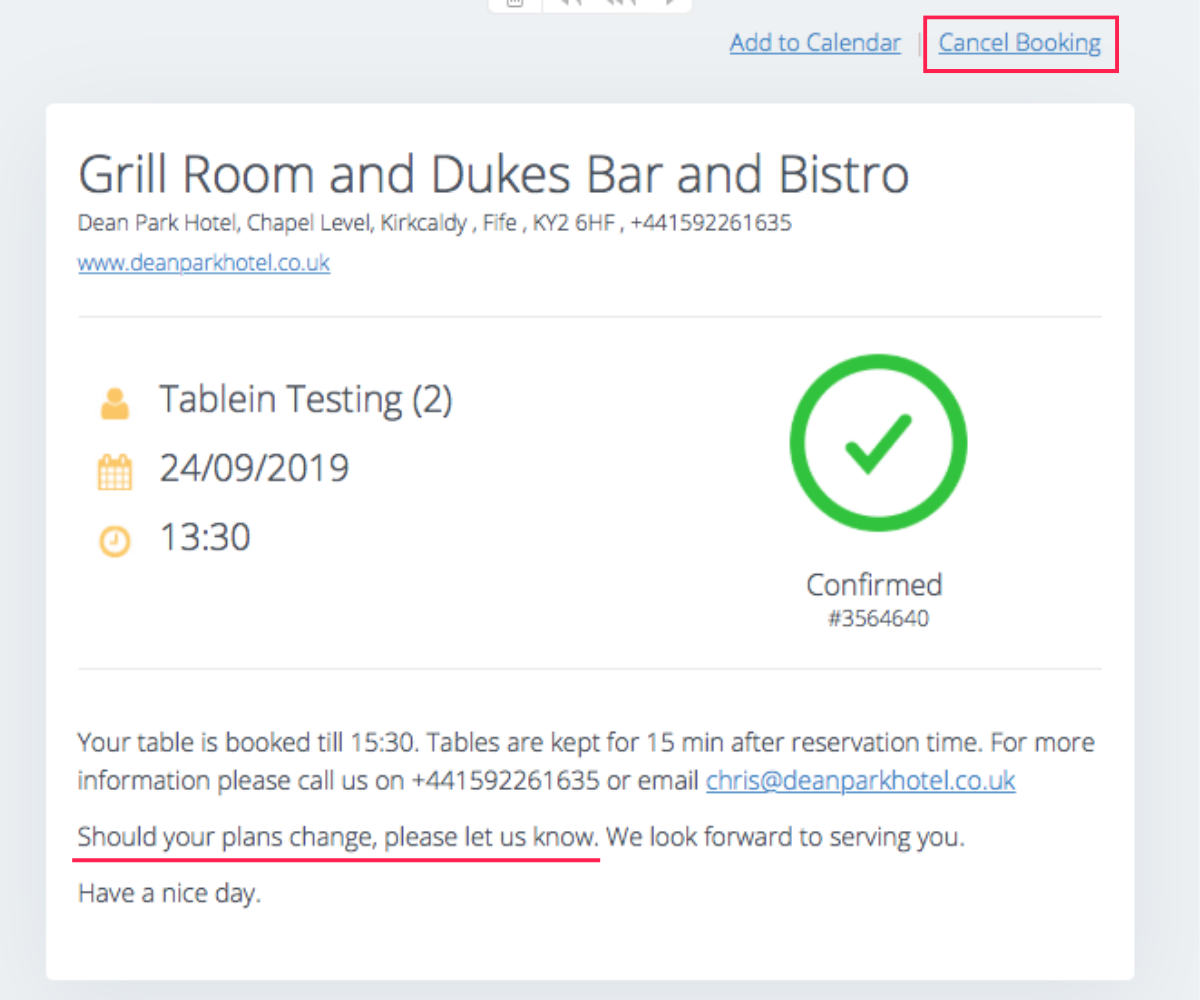
Source: Tablein
In summary, by displaying your cancellation policy on your website, within the reservation widget, and through email communications, you equip your customers with the knowledge of cancellation fees right from the beginning.
This empowers them to make informed decisions when making reservations and gives them insight into how to cancel a reservation on time.
Conclusion
In conclusion, carefully implementing late cancellation fees offers a solid solution to fight against the negative impact of no-shows and late cancellations.
This strategic approach acts as a shield for your business against the common challenges within the restaurant industry.
We part with the hope that the information provided here will help you in efficiently managing no-shows and late cancellations in your restaurant.
Get a 30-day Exclusive Trial
As a Tablein blog reader, you’re eligible for an exclusive 30-day free trial to experience our simple reservation solution for your restaurant.
Enter your business email, and we’ll send you all the steps needed to create your account.
Share this
You may also like

How to Manage Last-Minute Restaurant Reservation Cancellations

Top Restaurant Automation Tools for Streamlining Operations
